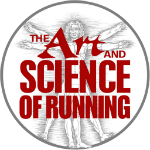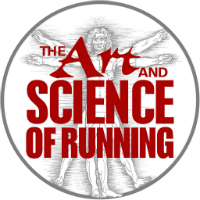In this episode of the Art and Science of Running Podcast we speak with Dr. Carla Rodriguez Dimitrescu about nutrition for endurance events, particularly long-distance running. Carla is a national champion ultrarunner who has competed internationally in running and swimming. She recently returned from the 24 Hour World Running Championships in France and shares some of the lessons she learned. Carla studied Nutrition and Metabolism in Mexico, the USA, and Canada and eventually earned a PhD in Nutrition and shares some of her insight in experience with us to help maximize training, racing, and recovery.
Carla’s athletic career started early while still a young girl in Mexico. Eventually, she found running while warming up and for dry land training for swimming. After a 12 minute running test with her swimming teammates, Calra realized that she was actually quite good at running and began taking it a bit more seriously.
As a teenager, Carla participated in modern pentathlon while also specializing in the 200m Butterfly in the pool.. When she began studying formally in university, Carla took a break from competitive swimming. She decided at a young age to be nutritionist and ultimately earned a PhD in clinical nutrition while concurrently working in Sports Nutrition. Carla is also a Certified Sports Nutritionist.
The underlying theme of Carla’s message is that “we need to learn to listen to our bodies.”
Are night shades inflammatory or anti-inflammatory?
“Everyone is different. If we perform a study of 15-20 people we’ll get results, but that doesn’t mean it is applicable to everyone. The more we study. The more we realize how different we are. The more we study the more questions we have. We are extremely complex. “
“Try to eat local. That’s how you can better control the quality of the foods that you eat.”
“Keep a journal about the foods that you eat and how they impact you.”
24 Hour World Championships in Albi, France
Calra recently competed in the 24 Hour World Championships in Albi, France. We discuss the challenges of travel, time change, foreign foods, different types of water, thirst, and language barriers.
Training and fitness felt good, but ultimately Carla had challenges with the water. There were so many water options that she inadvertently purchased and consumed the wrong type of water. The kind that she purchased and used in the race had a higher calcium content that she was accustomed to so it didn’t sit well with the family.
Carla fuelled with a combo of gels and electrolyte drinks as well as Fanta or Orange Crush.
When travelling it can be hard to find food that sit well and that you are familiar with. To further complicate things, restroom facilities can be different as well.
Carla felt a great sense of pride running and representing her home country of Mexico.
Omar, her spouse, crewed for her and helped her take care of her nutritional needs.
The championship event in France was a looped course so she could see family, friends, and team every 1.5 km.
One thing that stood out to Carla was how animated the French fans were.
For the first 6 hours Carla was on personal record pace, but then she began feeling the stabbing pain in her stomach caused by the calcium in the water. Despite a fast first 80K, Carla decided to call it when her stomach turned because didn’t want to end up in a hospital in a foreign country with a self-inflicted wound.
“It’s embarrassing that I failed in what is supposed to be my forte, but I learned something new and now I can help people avoid the same problem that I encountered.”
Why do most sports drinks contain sodium?
Sodium speeds up the absorption of glucose which will speed up energy availability and restore glycogen. This is called co-transport and it helps to avoid fatiguing the small intestine.
Electrolyte consumption can also help avoid dilution of blood and hyponatremia – excess of total body water relative to sodium content.
Can diet help reduce injury?
Yes, the first step is to get lab work done and determine if there are any deficiencies.
Insufficient Vitamin D, Calcium, Protein, Iron can all lead an athlete to be more vulnerable to injury.
One key to recovery, maximizing gains from exercise, and minimizing injury risk is to consume a mixture of carbs and protein within 30 minutes of activity.
We are also more prone to injury when dehydrated, so hydration throughout the day is key.
Do you recommend supplementation?
It depends on the lab results and where a person lives. Many people in the Northern Hemisphere don’t get enough Vitamin D or Calcium in their daily diets so supplementing can be helpful.
Keep in mind that a supplement will provide 1,000 international units of vitamin D while 10 minutes of sun = 15,000 international units of vitamin D.
How should we balance nutrition to lose weight while fuelling appropriately for training?
“Low body weight doesn’t always correlate with better performance. The fact that you lose a couple of pounds doesn’t mean that you are going to run faster.”
Some people like Ryan Hall get so light that they not only risk their musculoskeletal health, they jeopardize their hormonal health.
“Don’t force weight. We don’t always have to be at the exact same weight. Our weight fluctuates.”
It is a balance between the volume and intensity of training as well as the calories and quality of calories. If I’m doing the training and I’m eating appropriately I’m going to be ready when I toe the line.
“Weight is just a number. It doesn’t take into account body composition. If there is more muscle, of course you’re going to be heavier.”
“Listen to your body. What is your body trying to tell you. I think we’ve really lost that connection. If your body is telling you I’m graving saltiness then maybe you need some sodium. It all goes back to listening. Your body is quite smart. There is a reason your body is trying to talk to you. If you’re having all of those cravings then your body is telling you that it needs something.”
Before you start any diet, look at the lab work and make sure that it is a plan that works for you.
Are you healthy?
Are your kidneys healthy?
Is your liver healthy?
Be kind to your body. Don’t hate your body. Fuel your body. Eat good foods.
Carla relies a lot on cross training. Run in the morning and then swimming in the evening.
To work with Carla, please visit https://www.peakrunperformance.com/ to learn more about the nutrition coaching services that she offers and sign up to work with her.
All of this and more in Episode 12 of the Art and Science of Running Podcast.
Intro and outro music GOIN 4 A WALK by Dallin Puzey.
Please listen, subscribe and rate this podcast on Apple Podcasts, Spotify, Stitcher or wherever you listen to podcasts.
Follow us on Twitter and Instagram and like us on Facebook.
Join the Art and Science of Running Facebook Group to participate in discussions and let us know if you have particular questions that you’d like us to discuss in future episodes.
Podcast: Play in new window | Download
Subscribe: Google Podcasts | RSS




